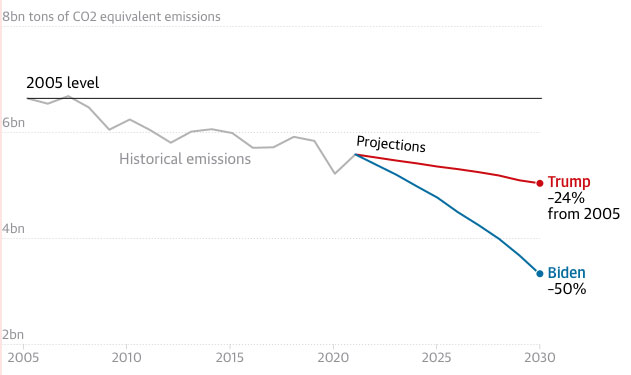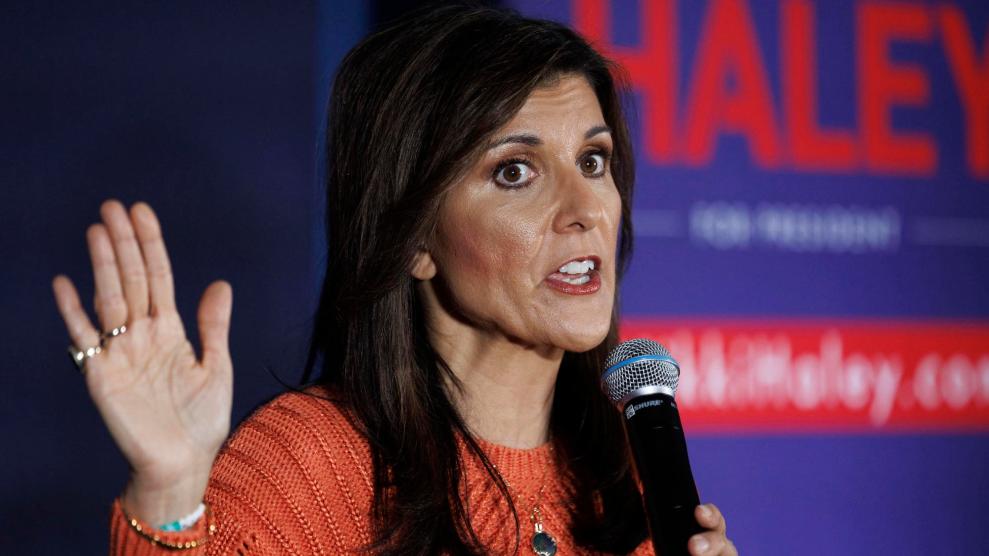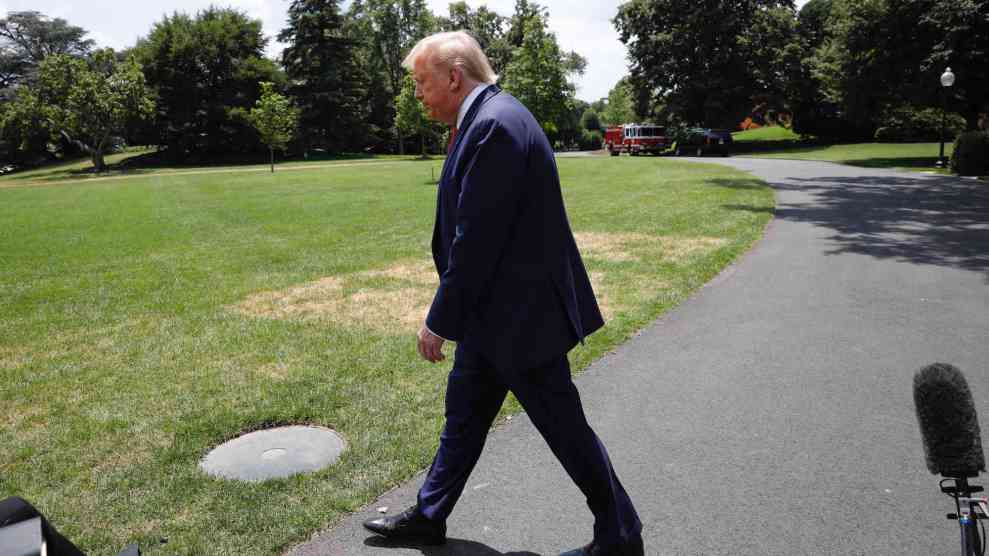
Andrew Harnik/AP
This story was originally published by the Guardian and is reproduced here as part of the Climate Desk collaboration.
The United States’s first major climate legislation dismantled, a crackdown on government scientists, a frenzy of oil and gas drilling, the Paris climate deal not only dead but buried.
A blueprint is emerging for a second Donald Trump term that is even more extreme for the environment than his first, according to interviews with multiple Trump allies and advisers.
In contrast to a sometimes chaotic first White House term, they outlined a far more methodical second presidency: driving forward fossil fuel production, sidelining mainstream climate scientists, and overturning rules that curb planet-heating emissions.
“Trump will undo everything [Joe] Biden has done, he will move more quickly and go further than he did before,” said Myron Ebell, who headed the EPA transition team for Trump’s first term. “He will act much more expeditiously to impose his agenda.”
The prized target for Trump’s Republican allies, should the former president defeat Joe Biden in November’s election, will be the Inflation Reduction Act, the landmark $370 billion bill laden with support for clean energy projects and electric vehicles. Ebell said the legislation, signed by Biden in 2022 with no Republican votes, was “the biggest defeat we’ve suffered.”
Carla Sands, a key environment adviser to the pro-Trump America First Policy Institute who has criticized Biden’s “apocalyptic green fantasies,” said: “Our nation needs a level regulatory playing field for all forms of energy to compete. Achieving this level playing field will require the repeal of the energy and environment provisions within the Inflation Reduction Act.”
The GOP-controlled House of Representatives has already pushed bills to gut the act. But fully repealing the IRA, which has disproportionally brought popular funding and jobs in solar, wind, and battery manufacturing to Republican districts, may be politically difficult for Trump even if his party gains full control of Congress.
However, Trump could still slow down the progress of the clean energy transition as president by redrawing the rules for the IRA’s generous tax credits.
He would, his allies say, also scrap government considerations of the damage caused by carbon emissions; compel a diminished EPA to squash pollution rules for cars, trucks and power plants; and symbolically nullify the Paris climate agreement by not only withdrawing the US again but sending it to the Senate for ratification as a treaty, knowing it would fail.
“The Paris climate accord does nothing to actually improve the environment here in the United States or globally,” said Mandy Gunasekara, Trump’s former EPA chief of staff. She argued that the agreement puts too little pressure on China, India and other developing countries to reduce their emissions.
In recent rallies, Trump, the likely Republican nominee, has called renewable energy “a scam business” and vowed to “drill, baby, drill.” On his first day in office, Trump has said he would repeal “crooked Joe Biden’s insane electric vehicle mandate” and approve a glut of new gas export terminals currently paused by Biden.
Areas currently off-limits for drilling, such the Arctic, will also probably be opened up to industry by Trump. “I will end his war on American energy,” Trump has said of the incumbent president, even though in reality the US hit record levels of oil and gas production last year.
“I expect the Republicans will put together their own very aggressive reconciliation bill to claw back the subsidies in the IRA,” said Tom Pyle, president of the free market American Energy Alliance and previous head of the Department of Energy’s transition team under Trump.
“The president will benefit from having the experience of being in office before, he’ll get a faster head start on his agenda. He won’t be encumbered by the need to be re-elected, so there will be a short window of time but he may be more aggressive as a result.”
Critics of Trump, who are already fretting over his potential return to the White House, warn this agenda will stymie clean energy investment, place Americans’ health at the mercy of polluters, badly damage the effort to address the climate crisis and alienate America’s allies.
“A return of Trump would be, in a word, horrific,” said Andrew Rosenberg, a former National Oceanic and Atmospheric Administration official, now fellow at the University of New Hampshire. “It would also be incredibly stupid. It would roll back progress made over decades to protect public health and safety, there is no logic to it other than to destroy everything. People who support him may not realize it’s their lives at stake, too.”
A second Trump term would be more ideologically extreme than the first, with fewer restraints, Rosenberg claimed. “There were people part of a reasonable mainstream in his first term who buffered against his craziest instincts—they won’t be there any more,” he said.
Should Trump manage to repeal the IRA and water down or scrap EPA pollution rules, there would be severe consequences for a world that is struggling to contain an escalating climate crisis, experts say.
The US, the world’s second biggest carbon polluter, would still see its emissions drop under Trump due to previous policies and a market-led shift away from coal to gas as an energy source, but at only half the rate of a second Biden term, according to an analysis by Energy Innovation shared with the Guardian.
Emissions projections for a future Trump or Biden administration*

This would deal a mortal blow to the global effort to restrain dangerous global heating, with scientists warning that the world needs to cut greenhouse gas emissions by nearly half this decade, and eliminate them entirely by 2050, to avoid breaching agreed temperature limits and plunge billions of people into worsening heatwaves, floods and droughts.
“I don’t think Donald Trump would actually be able to replace the IRA, but you couldn’t rule it out,” said Anand Gopal, executive director at Energy Innovation. “If he did, the global effect would be potentially disastrous. It would encourage everyone else to go backwards or slow down their climate pledges and put the world way off track to where it needs to be. It could prove the difference between staying under 1.5C warming or not.”
Much will hinge upon any new Trump administration’s ability to better navigate arcane regulatory procedures and the courts. His previous term saw an enormous number of legal defeats for his hurried attempts at environmental rollbacks, as well as the departure of scandal-plagued cabinet members overseeing this effort.
“You can’t just snap your fingers,” said Jeff Navin, a former chief of staff at the US Department of Energy. “You need to spend a lot of time redoing regulations. Is that something Trump really wants to do rather than just pursue other grievances? I don’t think so.”
But some conservatives believe Trump will prove more successful second time around, pointing to an amenably conservative supreme court and more detailed planning ahead of the election, such as the Project 2025 document put out by the rightwing Heritage Foundation, which details severe cuts to the EPA and Department of the Interior, as well as a greater politicization of the civil service to push through Trumpian goals.
“We are writing a battle plan, and we are marshaling our forces,” Paul Dans, director of Project 2025, told E&E News last year. “Never before has the whole conservative movement banded together to systematically prepare to take power day one and deconstruct the administrative state.”
Jeff Holmstead, who ran the EPA’s air office during George W Bush’s administration, said Trump’s administration would be “much more prepared” for a second term.
“They know what they need to do to undo rules in a in a legally defensible way,” he said. A new Trump administration would take a more “surgical approach” to deregulation, he said, taking more of its cues from industry.
Under Biden, Gunasekara said, there has been an “unnecessary tension” between the oil sector and regulators.
“You have to work with the industry players,” she said. “Agencies should not be about suppressing or boosting particular technologies.”
Early on, Trump officials will probably work with Congress to kill certain rules through a parliamentary procedure called the Congressional Review Act. The Clinton-era statute empowers Congress and the president to work together to overturn major federal regulations within 60 legislative days of finalization, by passing a joint resolution of disapproval signed by the president.
“Generally in the past, anything that is finalized after mid- to late May is likely to be within that window,” said Holmstead. “So speed is of the essence for the Biden administration.”
A fresh Trump term could engulf federal climate scientists, too, who were ignored but largely allowed to issue their work during Trump’s last term. A new Trump White House could intervene more to alter climate reports, or even stage a previously mooted public debate on the merits of climate science.
“I expect that idea will be revived and I think we would get a much wider view of climate science that wouldn’t be controlled by a small cabal,” said Ebell. “That will start very quickly.”
Trump’s plans come as Biden has struggled to inspire younger, climate-conscious voters who have been angered by his ongoing leasing of public lands and waters to the fossil fuel industry, such as the controversial Willow oil project in Alaska.
Biden has overseen a boom in liquified natural gas exports that he has belatedly attempted to restrain and his administration has floundered in its attempts to sell the IRA to the American public, with most voters unaware of the climate legislation or its significance in driving down emissions.
Still, the president’s position on climate change is incomparable to Trump’s, according to Rosenberg. “The contrast is incredibly stark between Biden and Trump,” he said. “Do I think Biden is the best of the best? Of course not. But compared to Trump? That’s just scary.”
“Anyone who cares about public health, the environment, science, international relations, you could go on, should be scared about another Trump presidency,” Rosenberg added.














